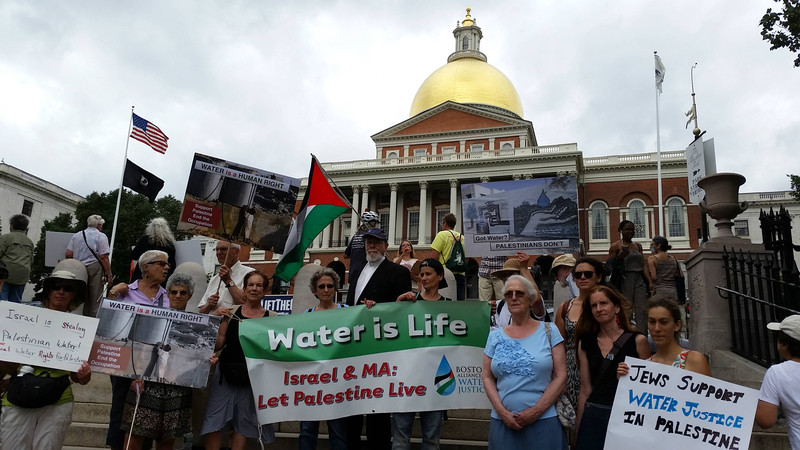The Alliance for Water Justice in Palestine raised awareness about human rights violations perpetrated by the national Israeli water company, Mekorot, by hand delivering an open letter to the Israeli Consul in Boston. Mekorot has been internationally denounced for implementing since its decades ‘water apartheid’ that is essential for Israeli efforts to colonize Palestinian lands and ethnically cleanse it from Palestinian communities. The company was once again in the news recently for shutting off water in many towns throughout Palestine this summer during Ramadan. In the summer temperatures can easily exceed 35 degrees Celsius and cutting water supplies to Palestinian communities is a key component of Israel’s policies to drive people from their lands and communities by making live unbearable and destroying their means of livelihood. The open letter led the group to lobby against an amendment on a bill that would penalize companies taking part in the BDS movement. The group’s initiative to raise awareness against Mekorot successfully led to the anti-BDS amendment to be withdrawn from the bill. More boycott activities is essential for building strength against current efforts in North America and Europe to outlaw BDS.
The national Israeli water company, Mekorot, systematically deprives Palestinians of access to water through policies that include the international crime of pillage of natural resources in occupied territory and discrimination against the Palestinian people as an ethnic group and lend vital support for the illegal settlement enterprise During Ramadan this past June Mekorot shutting off water to numerous cities and villages in Palestine, including Jenin, Nablus, and Salfit. Some people were forced to spend weeks without any access to water with temperatures easily exceeding 35 degrees Celsius. This has spurred renewed campaigning against Mekorot. The awareness raising actions of the Alliance for Water Justice in Palestine, based in Boston, Massachusetts, in July 2016 are a great example of this.
The Alliance for Water Justice in Palestine was founded in 2014 to counter the then-governor Deval Patrick’s Water Technology Initiative with Israel. Since its founding the organization has worked to publicize Israel’s discriminatory water policies and their use of water as a weapon against Palestinians. To learn more about the Alliance for Water Justice in Palestine visit their website here.
As part of their demonstrations against Israel’s water policies the group hand delivered an open letter to the Israeli Consul in Boston. The letter, which was widely distributed, aimed to raise awareness of Mekorot’s water apartheid and its actions during Ramadan. The letter outlined how Mekorot drastically reduced Palestinians’ access to water and cut off water to a number of cities and villages. The group holds Israel responsible for these actions because under international humanitarian law as an occupying power Israel must ensure the dignity and well-being of the population living under its control – this includes access to water.
Illegal settlements in the West Bank enjoy uninterrupted access to water while Palestinians are forced to pay large sums of money for a fraction of the water the settlers use. Palestinians only have access to seventy-three liters per capita per day of water, which is below the 100 liter standard set by the World Health Organization and well below the Israeli consumption of 240 to 300 liters of water per capita per day. A typical residential building in Palestine will have four to eight water tanks on the roof. If the water supply is depleted before the tanks are scheduled to be refilled the residents must resort to paying water trucks to replenish their water source. The average cost of refilling ones tank privately is anywhere from 75 to 150 NIS ($19 to $40). With an average monthly salary of only $600 in Palestine resorting to providing ones home with privatized water is too expensive for most families. It is precisely these realities the Alliance for Water Justice in Palestine is working to publicize.
The moment of victory came when the Alliance for Water Justice in Palestine visited the State House in Boston to distribute their letter and discuss the grave situation in Palestine with each legislator. Upon arrival at the State House they were informed the legislators would be voting on a bill that very afternoon which included an anti-Boycott Divestment and Sanctions (BDS) amendment. Local Zionist organizations had been lobbying the legislators to pass anti-BDS legislation to penalize businesses who engaged in nonviolent economic boycotts. After pressure from the Palestinian rights advocates Senator Cynthia Creem, who originally introduced the anti-BDS legislation, withdrew the amendment.
This is not the first time the BDS movement has come under fire in the United States. The BDS movement was founded eleven years ago by Palestinian over 175 Palestinian organizations representing Palestinians in their homeland and in the diaspora, as a way to put economic pressure on Israel to end its apartheid, colonialism and occupation. Among others, the United States is one of the main supporters of Israel and supplies them with over $3 billion annually in the form of military aid.

